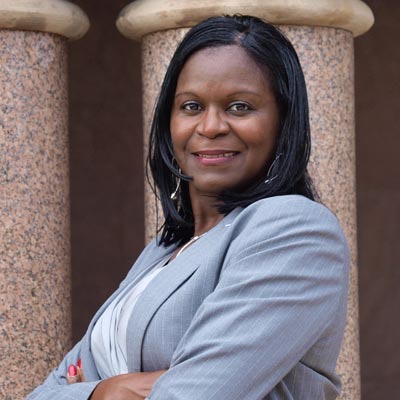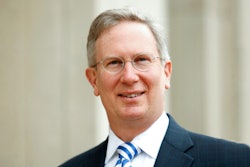 Angela McCaskill’s suspension by Gallaudet University has been met with tremendous backlash.
Angela McCaskill’s suspension by Gallaudet University has been met with tremendous backlash.Following the decision by Gallaudet University President T. Alan Hurwitz to suspend Angela McCaskill, the school’s chief diversity officer, fierce advocates have sprung up on both sides of the issue. The swirling debate has mixed the issues and clouded the controversy, making it difficult to discern which subject is being argued at which juncture.
Hurwitz placed McCaskill, an employee for more than 20 years, on paid administrative leave Oct. 10 for joining more than 200,000 Maryland residents who signed a petition calling for a voter referendum on same-sex marriage law.
Those on both sides of the issue have taken Hurwitz to task. They have protested at Gallaudet and called for her immediate reinstatement. One group, the Family Research Council, started a petition in McCaskill’s defense, accusing Hurwitz of “engaging in voter intimidation” and urging him to “fully respect the rights of employees to participate in the democratic process.”
It read, in part: “A person should no more be punished for signing a petition than they should be for voting. A citizen’s right to participate in our democratic process is at the core of our system of representative self-government.”
Howard Gardner, a professor at the Harvard Graduate School of Education, said university administrators should note the distinction between private votes and public advocacy, particularly on divisive political issues. He would make exceptions in instances where staffers have special expertise to offer, though that doesn’t extend to the case in question.
“It should be part of the hiring agreement that the administrator refrain from advocacy, or at least clear it ahead of time with the board of trustees. … I realize there has been a shift away from ‘disinterestedness’ in recent years, even for employees of state universities. I think that this is risky,” Gardner said.
The issue, primarily, is one of McCaskill’s ability to separate her personal political beliefs from her role as a diversity officer whose job it is to promote diversity—even in sexual orientation. In many eyes, calling for a referendum is tantamount to calling for the law’s repeal, which is incongruous with McCaskill’s job description.
“It recently came to my attention that Dr. McCaskill has participated in a legislative initiative that some feel is inappropriate for an individual serving as Chief Diversity Officer,” Hurwitz said in a news statement after his action. “However, other individuals feel differently. I will use the extended time while she is on administrative leave to determine the appropriate next steps.”
McCaskill has a problem with the school’s suspend-first-ask-questions-later approach, stating that Gallaudet has tarnished her reputation. The first deaf African-American to earn a Ph.D. at the school, McCaskill said a number of “ugly, hateful and deeply hurtful emails” have filled her inbox.
“I exercised my rights,” she said, using sign language with the help of an interpreter during a news conference Oct. 16. “I felt it was important that we as the citizens of Maryland have an opportunity to vote.”
Ellen Chaffe, former president of Valley City State University and Maryville State University, said a suspension seems unwarranted unless a specific school policy was violated. Otherwise, signing a position amounts to freedom of expression, unless it reflects on McCaskill’s ability to do her job.
“I think many presidents would err on the side of protecting [McCaskill’s] freedom of speech and waiting to see if in the end she wasn’t able to effectively perform her duties because of other people’s actions,” Chaffe said. “If a person is diversity officer and actively opposes gay rights, that should be a disqualifier from that position. They should not be hired and retained in that position.”
There’s no indication that McCaskill has views that conflict with her responsibilities. Gallaudet’s Web site indicates that, in October 2011, nine months after she was named associate provost of diversity and inclusion, McCaskill helped open an on-campus resource center for sexual minorities. Her history suggests there’s never been an issue, yet signing the petition became one in itself.
Azhar Majeed is well familiar with cases involving free speech and academic freedom on college campuses. But his organization, the Foundation for Individual Rights in Education, focuses on students and professors, not administrators. Majeed, FIRE’s associate director of legal and public advocacy, said university staffers enjoy less freedom to speak out on matters of public concern. He has mixed feelings on McCaskill’s case, but said decisions should be based on facts instead of feelings.
“You seem to have someone who was able to separate personal life and professional life and perform what was asked,” Majeed said. “There’s a pretty good argument that taking those personal views and translating them into political activity by signing the petition doesn’t change the nature of the work performance.”
“Whether political activity gets in the way of job function, that’s a factual inquiry,” he said. “What’s driving a lot of views on this issue is it’s the hot-button political issue of this day and age: gay rights and gay marriage. The other part is expressing herself on an issue that arguably touches her specific position in the diversity office. Someone in that position can question the propriety of someone engaging in that activity.”
Or not, as evidenced by McCaskill’s support and Hurwitz’s criticism from opposite sides of the same-sex-marriage debate.


















